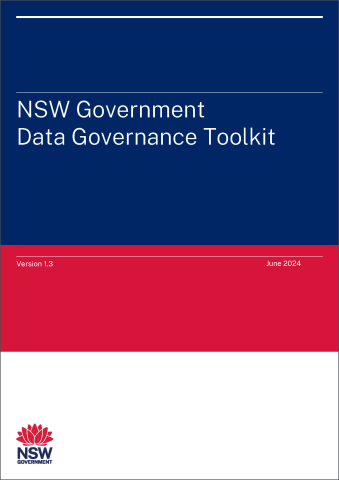Module 1: Introduction to Data Governance
What is data governance?
The Data Management Body of Knowledge defines data governance as “the exercise of authority, control and shared decision-making (planning, monitoring and enforcement) over the management of data assets” (DMBOK, 2017). Put simply, data governance is about implementing a set of policies, processes, structures, roles and responsibilities to ensure that an agency’s data is managed effectively, and that it can meet both its current and future business requirements.
An effective Data Governance Framework typically covers the following best practice content:
- Strategy and Planning
- Policy
- Functions or Roles and Responsibilities
- Data Management
Why is data governance important?
Data governance is as important to an agency as any other corporate, business or IT governance process. It ensures that data is understood, trusted and appropriately used. It ensures that the people who collect, manage and use data understand their responsibilities and see the value it adds to their work, the objectives of the organisation, as well as broader agency outcomes. Data governance is also an exercise in risk management because it allows agencies to minimise risks around the data it holds, while extracting the maximum value from it.
What are the benefits of good data governance?
Data governance, like any other program or process, must have a clear purpose for it to be beneficial. Instead of doing data governance for its own sake, it should be established to help an agency achieve its strategic objectives and it should be closely aligned to their business needs.
When data governance is aligned to the organisation’s needs, it can deliver specific benefits across three areas: business value, efficiency and risk mitigation.
- Improved decision-making by ensuring decisions are based on higher quality data
- Increased competitiveness through improved customer satisfaction
- Increased public trust through improved data management and transparency
- Reduction in duplication and waste created by information silos
- Increased data sharing through improved trust and standardisation
- Reduction in costs by improving resource and process efficiencies
- Reduction in time spent by employees finding, acquiring and processing data
- Reduction of risk and costs as data is better managed to support regulatory compliance
- More robust consideration of ethical and privacy issues to avoid reputational damage
Source: Adapted from Information Governance ANZ
Guiding principles of data governance
The NSW Government Data Strategy contains four themes, each of which is supported by key principles and sector-wide actions. A state government Agency’s data governance framework should support these themes.
This theme aims to accelerate the delivery of actionable insights to decision-makers by leveraging data and implementing innovative practices to deliver better outcomes. Key actions include designing data governance programs, standards, and practices to improve data quality and promote sharing and re-use.
This theme recognises data as a valuable asset by identifying, governing, and managing it effectively across its lifecycle, and using and sharing it to generate insights and support decision making. Key actions include identifying data and associated metadata as a significant state asset, creating a spend category for government procurement of data and data services, developing guidelines on calculating the cost and value of data, supporting data sharing across the sector, and procuring and sharing private and non-government sector data.
This theme aims to strengthen transparency and trust in the way it collects, manages, uses, and shares data by protecting customers' rights, taking a fit-for-purpose design approach to data projects, ensuring data quality, cultivating a culture of trust, and encouraging sharing and publication of methodologies, algorithms, and models.
The theme aims to develop a data-driven culture within government by investing in leadership and capability, making data more accessible, and accelerating the delivery of insights.
